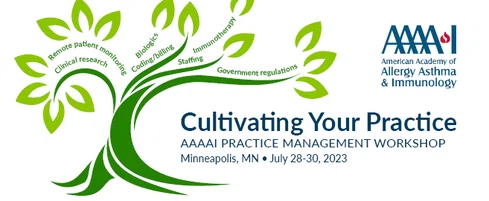


result

Feature Story
AAAAI Members Take a Stand on Burdensome Prior Authorization Practices
AAAAI Members Take a Stand on Burdensome Prior Authorization Practices
How They Got Started and How You Can Help

In theory, prior authorization is supposed to control healthcare costs by promoting lower-cost alternative treatments. The reality is that prior authorization is over utilized, leading to overburdened healthcare professionals and patient harm.

David A. Khan, MD, FAAAAI
AAAAI members have been hard at work taking a stand against these burdensome practices. In 2022, David A. Khan, MD, FAAAAI, formed the Prior Authorization Task Force. “Prior authorization negatively impacts patient care and wellness, is a huge burden for physicians and practice staff, and there has not been a lot of progress on reforms. As an active clinician, I can certainly attest to all of these negative aspects which impact my staff and my patients on a daily basis,” said Dr. Khan. “My goal in forming a Prior Authorization Task Force was to shed light on some of the unique aspects prior authorizations have on our specialty. I’ve been very pleased with the work the Task Force has already completed and look forward to further progress on prior authorization reform from the AAAAI.”
Recent efforts of the task force include publishing a new Position Statement, "The Impact of Prior Authorization in Allergy/Immunology: A Position Statement of the American Academy of Allergy, Asthma & Immunology.” The goal of the Position Statement was to codify guidelines for the areas of greatest concern to AAAAI membership that needed to be addressed for change in the prior authorization process.
Stuart L. Abramson, MD, PhD, AE-C, FAAAAI, Chair of the Prior Authorization Taskforce, noted that the Position Statement was published in the April 2023 issue of JACI: In Practice and involved many hours of effort by members of the task force. “This document has already been distributed to congressional policymakers in follow-up to meetings that Advocacy Committee leadership had in conjunction with our participation in the AMA National Advocacy Forum in Washington, DC, which also focused heavily on prior authorization issues,” he said. “There are additional plans in development to use the document to raise awareness of patient harms and burden on allergy practices, and it may be used by RSLAAIS leadership to help raise awareness and support initiatives at the state legislative level.” The statement is based in part on the AMA’s Principles for Prior Authorization Reform.
Getting involved in advocacy work can seem intimidating, but there are things you can do right now to help the cause. Sending the AAAAI your experiences with prior authorization in which patient outcomes were negatively impacted, physician burden was unnecessarily increased, and/or care for your patients was complicated, undermined or delayed, is critically important. Please send specifics of the issue with dates, the payer, and the patient’s demographic information included, but personal health information excluded, to advocacy@aaaai.org.
Dr. Abramson shared his own example of how prior authorization has negatively impacted his practice and patients. “I had a recent struggle with getting IVIG for a patient with common variable immunodeficiency that had been diagnosed more than five years ago. She had been getting IVIG monthly without difficulty and then moved and had to change insurance, who denied coverage and required a peer-to-peer review for prior authorization approval. My conversation with this reviewer failed to change the denial as he said that the patient still needed to get pneumococcal vaccination and post-vaccination titers per the insurance company policy. This patient had an initial IgG of less than 30 mg/dL and there was no question in my mind about the diagnosis and need for IVIG based on guidelines. Nevertheless, she was off IVIG for several months and had to get vaccinated and have post-titers drawn. They were inadequate to show protection and the patient was subsequently approved for IVIG. She could have faced significant infectious morbidity in the interim period, and the situation was quite stressful for her.”
Another way you can get involved is at the regional and state level. Consider getting in touch with your Federation of Regional, State & Local Allergy, Asthma & Immunology Societies (RSLAAIS) or state medical association and see if you can participate in advocacy efforts in conjunction with them. Some state legislatures have programs that allow for experts, such as physicians, to provide comments on important advocacy issues during dedicated sessions or events. Your state medical association can play a significant role in regulating state commercial payers, allowing you to make a difference at the local level.

“I have enjoyed getting to talk with policymakers as well as academic and practicing physicians and the lay public about issues germane to our specialty. The problems around prior authorization are among some of the most pressing concerns that we face today.”

Stuart L. Abramson, MD, PhD, AE-C, FAAAAI, Chair of the Prior Authorization Taskforce
Prior authorization advocacy work from the AAAAI isn’t slowing down. A survey of part of the AAAAI membership was done by the Prior Authorization Task Force in the fall of 2022 to determine how prior authorization rules were impacting practices. The data reflected similar sentiments to AMA surveys on this topic: prior authorizations cause significant financial burden to clinical practice and can significantly impact/delay patient care that can lead to serious adverse events in some circumstances.
“A manuscript describing this survey and results is in progress and will be submitted for publication this year,” Dr. Abramson said. “You can always reach out to us at advocacy@aaaai.org for specific suggestions regarding timely advocacy needs and methods.”

Dr. Abramson will also be speaking at the 2023 AAAAI Practice Management Workshop. “This workshop has been an annual highlight for the AAAAI Office of Practice Management for years. I will be discussing prior authorization within a larger session on governmental regulations entitled “Government Regulations Allergy Practices Need to Know”. There are a variety of sessions that will have topics of great interest including coding and billing, use of oral immunotherapy in practice, and the new USP 797 rules,” he said.
Click here to learn more about the Practice Management Workshop, being held July 28-30 in Minneapolis.
What Can You Do Right Now to Make the Prior Authorization Process Less Burdensome?
- There are some ways that the process can be more effectively streamlined, such as using the CoverMyMeds online application for certain pharmacy items which allows you to know exactly what you need to put in.
- Fill out forms completely and make sure that they are the most up-to-date forms. Missing information causes further delays, and companies expect all requested information to be complete and accurate.
- Keep records of what procedures or medications have required prior authorization in the past, so you can prepare in advance.
- In particular with biologics, utilize the pharmacy programs that provide free product for several months or even up to a year, until prior authorization for the patient is achieved.





